2017 Chuck Green Fellows
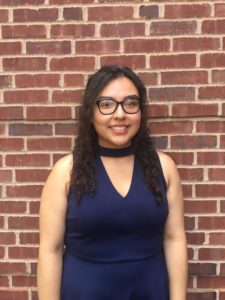
Nadia Berriel Miranda (she/her/hers)
Class of 2018
Applied Mathematics and Statistics, Political Science and Sociology
Comunidades Latinas Unidas en Servicio (CLUES)
Sexual education in Minnesota is very problematic because there is not a statewide, district-wide, or even school-wide curriculum for sexual education. Teachers are free to create their own curriculums, meaning students attending the same school could be learning completely different things about sex and reproductive health depending on which teacher they have. Although the teen birth rates have declined to its lowest levels since data collection began, the US still has the highest teen birth rate in the industrialized world. Across all races and ethnicities, Latinx teens have the highest pregnancy rates.
This summer I worked with CLUES as their Sexual Health Program Coordinator in their Teen Pregnancy Prevention Program. One of my main projects at CLUES was to help create a curriculum that would effectively acknowledge Latinx culture and their beliefs on sex in order to provide a better sexual education for parents and youth. We facilitated multiple workshops across the Twin Cities for Latinx parents giving them the necessary tools to talk to their kids about sex. We also held sexual education workshops for youth, which included topics regarding sexuality and gender, female and male reproductive systems, birth control, healthy relationships, and consent. Smaller projectS of mine included data analysis of focus groups and pre and post surveys done with youth, which is where my Math major came into play, and applying for grants.
This fellowship gave me the opportunity to experience what it is like to work at a non-profit organization, learn how to build community partners, and work with youth. It also gave me the chance to work with the Latinx community in the Twin Cities on a vital issue affecting my community, which is something I am passionate about. For the future, I would like to continue working for the Latinx community in the Twin Cities.
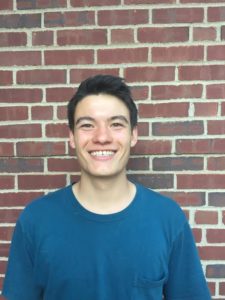
Isamu Bix (he/him/his)
Class of 2019
IS — Public Health Focus
Minnesota AIDS Project & MN Department of Health
Harm reduction, the practice of reducing negative consequences associated with people who engage in high-risk behavior, has repeatedly prevailed over forced abstinence as the most effective method for fighting injection drug-related health issues. Despite a mountain of evidence backing this approach, the United States has been slow to embrace it. As a result, syringe access initiatives are underfunded and HIV, Hep C, and other blood-borne diseases spread rapidly via needle-sharing. I chose to work with the Department of Health and the Minnesota AIDS Project because I knew that I would be able to contribute significantly to the health and safety of the cities I now call home.
My summer projects were designed to improve syringe access at Minnesota pharmacies. Minnesota law states that pharmacies may sell syringes to non-perscription customers. The consequence of the law’s ambiguous phrasing is that drug users are often rejected, and sometimes even chastised, by pharmacists when attempting to access sterile syringes. I created a mobile yelp-inspired website that maps all pharmacies in the state and allows users to rate/report them based on their experiences. The site also features a community forum for local harm-reduction organizations as well as resources for overdose prevention, legal rights, safe-injection and disposal practices, and links to services. In addition, I worked closely with several Walgreens district managers to create educational materials for pharmacists, many of whom do not understand the public health rationale for syringe access. My work with Walgreens ultimately resulted in a policy shift at all of their Minnesota locations.
While I enjoyed all aspects of the fellowship, my favorite experiences were all at the syringe exchange. There, I would work with dozens of injection drug users every day. This experience helped me break down my own biases and form genuine relationships with amazing people I otherwise would have been too closed minded to connect with. I am excited to continue working on the website while abroad and to re-join the Minnesota AIDS Project as an intern upon my return.
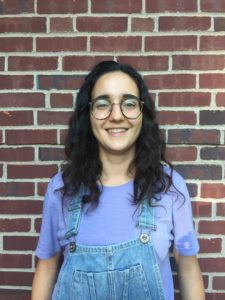
Ceren Dolma (she/her/hers)
Class of 2019
Environmental Studies and Sustainable Design, Urban Studies
Transit for Livable Communities + St Paul Smart Trips
In an increasingly urbanized world where more than half of the people live in cities, global sustainability issues are inevitably connected with collective behaviour in cities. Having lived in different cities in the past, and currently living in a conurbation that is the Twin Cities, I have always been fascinated by the systems that keep a city running. If done right, these systems can contribute to well being of the people, as well as the environment. In conjunction with my academic interests on sustainability and right to the city, I grew increasingly interested in transportation systems and participatory planning.
As a part of the Chuck Green fellowship, I had the privilege of partnering with Transit for Livable Communities and St Paul Smart Trips, a recently merged NGO that advocates for a multimodal transportation system to strengthen community, improve health and opportunity for all people. My project focused on the organization’s outreach and public engagement efforts on a new transit initiative and my tasks included, but were not limited to, creation of internal and external communication materials, data collection and analysis, as well as building partnerships with other organization to broaden our reach. I also had to opportunity to sit at official planning committee meetings and get a better understanding of the governmental planning processes. I particularly enjoyed being able to look at these with a critical lens and work together with my organization to fill in the gaps when the official outreach efforts fell short when it came to reaching out to traditionally underserved communities.
Although my fellowship has come to an end, the efforts of TLC + St Paul Smart Trips and my project are ongoing. I am looking forward to keep in touch with my organization and closely follow the next steps of the project with the hope that the work I have done over the summer can inform a new transit line that might be built after I leave Macalester!
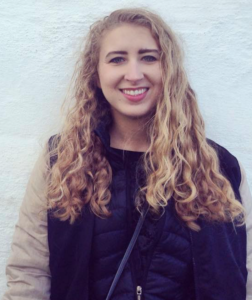
Katherine Garrett (she/her/hers)
Class of 2018
Political Science
Camp Noah–Lutheran Social Service.
Growing up, I eagerly attended Girl Scout camp every year. Once I was too old to be a camper, I began serving as a counselor. Over the course of these many summers, I discovered the unique ways in which camps can help children to gain confidence and resilience, which in turn help them overcome seemingly insurmountable challenges.
This summer, I worked Camp Noah, an organization which runs camps across the country each summer for children who have been affected by natural or man-made disasters. I reviewed the organization’s health and safety policies in preparation for their upcoming accreditation review by the American Camp Association. In addition, I served at a camp in Kern County, CA for children who lived through the Erskine wildfires in the summer of 2016.
My favorite part of the Chuck Green experience was the weekly meetings that were held during the summer. These meetings allowed me to share my successes and challenges with a group of supportive people who were having similar experiences. In many ways, the support of other Chuck Green fellows mirrored the support I’ve felt from other counselors while working at summer camps.
In the future, I hope to pursue a degree in Marriage and Family Therapy so that I can continue the work of supporting vulnerable children and families.

Ariana Hones (she/her/hers)
Class of 2018
English, International Studies, Human Rights and Humanitarianism
Neighborhood House and CommonBond Communities [Torre de San Miguel]
I have always been very drawn to working with youth and understanding the ways in which we can encourage young people to engage with their communities. When applying for the Chuck Green Fellowship I wanted my project to focus on the idea of “home” and how we can effectively build community and share identities that are vital to positive growth by cultivating spaces of intentionality. For youth living in transition it is crucial to have a community of peers and adults who provide a safe, stable, and challenging space where they can discover passions and empower themselves. With Neighborhood House I have been exploring youth development through curriculum design and building as well as being the lead facilitator for K-5 and middle school programming. At CommonBond, I am co-facilitating a mural project in their Teen Center once a week, with the hope that the youth will be able to imagine and visualize new communities while also recognizing the impact that they can have in the present moment on the West side of St. Paul.

Euijin Kim (she/her/hers)
Class of 2019
Economics, Geography, Community and Global Health
Minnesota Department of Health, SEWA-AIFW
This summer I had the opportunity to work with the Minnesota Department of Health (MDH) for my Chuck Green Fellowship. I worked as a community health liaison between MDH and the South Asian community in the Twin Cities represented by SEWA-AIFW. For my project, I assisted SEWA-AIFW in building capacity for a new culturally-specific mental health and domestic violence support program. Also coming from a culture that treats mental health and domestic violence as a taboo, I felt invested in SEWA’s efforts in providing their community with resources and access to healthcare. The second component of my work was supporting MDH with various projects also with a focus on health equity. I really enjoyed working first-hand with communities and learning from a range of people about health equity. Gaining experiences from both a large governmental organization and a small non-profit tremendously expanded my understanding of collaboration in community health. This summer completely changed how I understand health, and I feel very driven to further pursue public health. I am excited to continue building upon this experience, and further research how minority populations can get better access to health care services.
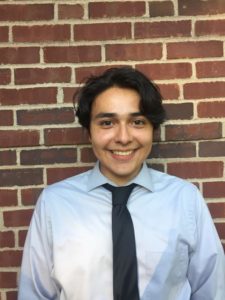
Ramon Molina (he/him/his)
Class of 2019
Physics, Mathematics
Fresh Energy
In the summer of 2016, I received an open invitation to apply for the Chuck Green Civic Engagement Fellowship. This was the same summer I had spent as “time-off” after my first year in college, which I came to regret as the beginning of sophomore year drew near. I knew I did not want to spend another summer without challenging myself. At the same time, I felt inadequate as a student, let alone someone qualified to participate in a competitive application process for the fellowship. But an unadulterated bolt of inspiration struck me that fateful night, and thus began my experience.
Even after being selected as one of twelve students of the 2017 cohort, I was not sure I deserved to stand alongside my cohorts. I felt awkward having “taken the place” of a potentially better qualified applicant as a Physics major. These insecurities and doubts would overtime subside and eventually be replaced by feelings of confidence, but I must stress my positionality as honestly as this.
In an effort to apply what I had learned in my less-than-similar-to-politics discipline, I focused my efforts on drafting a project that had something to do with energy efficiency and the direct impact it has on people’s lives. Specifically, I knew I wanted to partner with an organization that was working on projects to address inequities in the energy industry and marginalized groups of people in the Twin Cities. This action plan took time to fully articulate, but I eventually found myself in a partnership with Fresh Energy.
My project was conducted in two phases over the course of ten weeks. In support of Xcel Energy’s plan for the implementation of a community solar garden (CSG) in the Railroad Island community of Saint Paul, I performed research on eighteen other neighborhoods which my supervisor and I thought could benefit from a CSG. One comprehensive spreadsheet later allowed me to supplement Fresh Energy’s formal comments on Xcel’s proposal. For the second phase of my project, I joined a collaborative effort with Fresh Energy and Community Stabilization Project to reach out to low- to moderate-income residents of the Twin Cities. As opposed to data-mining, this phase focused much more on the people who are directly impacted by this work and served to remind me that conversations with a person and their family on energy burden drives the very work I have come to appreciate.
This fellowship has left a deep impression on my development as a student – nay, a human being – during my time here at Macalester. It has taught me to be less hesitant and to accept the challenge of stepping into a trying and unstable environment, as I might find to be the case in the future. Even so, I am an optimistic person and hope to continue studying engineering and renewable energy, perhaps either in California or Minnesota. My ambitions are humble and I would like to say that I am not only closer to achieving them, but also in an immeasurable debt to my cohorts and this fellowship for the support I have received.
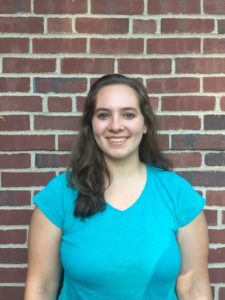
Lucille Moran (she/her/hers)
Class of 2019
Political Science, Legal Studies
Women’s Advocates
Domestic violence is a topic that no one wants to talk about. However, at the same time, it is an extremely prevalent part of our society. In Minnesota, one in three women will experience intimate partner violence at some point in their lifetimes. While domestic violence affects all genders, ages, and people of all socioeconomic statuses, shelters and other resources continue to be underfunded. These disparities inspired me to partner with Women’s Advocates, which is credited as the first shelter in the nation. This shelter provides services to 50 women and children on a daily basis as well as a 24-hour crisis hotline for survivors of domestic violence.
Throughout my 10 weeks, I worked with Women’s Advocates to build a working public policy program to ensure their financial stability and increase their political reach within Minnesota. My goal was that after my fellowship was completed, Women’s Advocates would have a working plan for pursuing different legislative measures. Given the current political climate at both the state and federal level, it is more critical now than ever before that these organizations become involved in the political process. My work for Women’s Advocates included conducting a major environmental scan on the political work of other shelters, completing legislative history research, reaching out and mobilizing college-aged individuals to expand their volunteer network, and preparing the organization for a “Day on the Hill” that is scheduled to occur this coming March. This work was both eye opening and informative. It gave me a closer look into the intense reality of domestic violence and inspired me to continue to fight for women’s safety.
The Chuck Green Fellowship is a unique opportunity that has provided me with both practical and personal skills. Through this fellowship, I have learned how to navigate the nonprofit world and how to conduct myself in a professional environment. The fellowship also taught me how to think big and speak up when I have an idea, boosting my confidence as an individual. I know I will use the skills that the Chuck Green Fellowship has provided me within my remaining two years at Mac as well as in my journey into the professional world.
After completing this project through the fellowship, I know that this is the type of work that I want to continue to pursue in the future. I fully intend on using the many positive relationships I have built throughout the summer at Women’s Advocates to help further my career in fighting for the prevention of violence against women. While at Macalester, I plan to continue to work with Women’s Advocates to further advance their public policy program and break the cycle of domestic violence. Following graduation, I hope to attend law school and continue fighting for survivors of abuse on a larger scale.

Halley Norman (she/her/hers)
Class of 2019
Political Science, Women’s, Gender, and Sexuality Studies, Hispanic and Latin American Studies
Since my senior year of high school, the accessibility of politics has stood out to me as one of the greatest factors in deciding how, and at what level, we engage with the people and policies shaping our lives. While I started with an entirely different project in mind, my focus during the fellowship shifted to actually address the issues I started thinking about two years ago – what is holding people back from engaging with their local politics and politicians? In what ways are, or aren’t, politics accessible to everyday people? How can people more effectively be engaged, and engage themselves in, their political leadership?
I partnered with TakeAction Minnesota – a statewide organization working towards political base-building and co-governance. Conceptually, this means we worked to organize not around individual candidates, bills, or other short-term projects, but around more long-term issues, and to build strength within communities, not just through them. It also meant working to elect leaders who aimed to work with their constituents while in office, and to seek out opportunities to more effectively represent and act on constituents’ needs. Practically, it meant running candidate forums and working on TakeAction’s endorsement process – directly connecting candidates and constituents, and then letting them decide who we would put our support behind.
While I had a lot of appreciation for the idea of base-building and community organizing going into my fellowship, I don’t think I fully understood what being a part of that work would mean. How it panned out was that, while things like making information about events and processes accessible had an impact, it didn’t create dramatic change. Instead, what created major shifts – both in individuals, and in systems like the DFL nominations, was relational organizing – making powerful connections with people on a 1:1 basis, from which it was actually possible to build long-term powerful work. I was lucky enough to benefit from that, too. The level of investment I received, both in terms of simply getting to know me, and in my own personal growth as an individual and an organizer, I gained a greater understanding of how important it is to get beyond just fixing the leaks by making voter registration easier to understand (or other similar projects), and to actually reach the individuals you hope to engage and work with. Failing to do that, and only fixing the leaks, will just leave you with a political system made up of patches, with nothing more powerful to hold it together.
Alex Ramiller (he/him/his)
(photo unavailable)
Class of 2018
Geography, Economics, Music
Saint Paul Riverfront Corporation
We often take for granted the quality of life that comes with living in the Twin Cities, but creating and maintaining vibrant and diverse cities is a complex and ongoing process that is subject to extreme challenges. While cities draw obvious economic benefits from increased development, for example, that development has the potential to hurt the social fabric by displacing current residents. As a student of economic geography, I have become fascinated with the economic development of urban areas and the ways in which those processes either benefit or harm marginalized communities. Partnering with the Saint Paul Riverfront Corporation was thus the perfect opportunity to observe these conflicts firsthand and support positive development in St. Paul. My project focused on contributing to a “Development Framework” for downtown St. Paul, which involved gathering information on the current conditions, producing compelling data visualizations, and researching strategies used by other cities to increase the vitality of their downtowns. Over the course of my fellowship, I particularly enjoyed having the opportunity to engage directly with stakeholders, including representatives of the city government and local Chamber of Commerce, as well as various property owners and residents. Through those interactions, I gained a much clearer understanding of the complexities of city politics as well as successful strategies for pushing city planning projects forward.
One of my primary goals for this fellowship was to gain experience in urban planning, and my positive experience at the Saint Paul Riverfront Corporation has made me seriously consider pursuing urban planning in the future. In the shorter term, I intend to continue working with the Saint Paul Riverfront Corporation over the course of my senior year, helping them build upon my summer research and implement the downtown development framework.
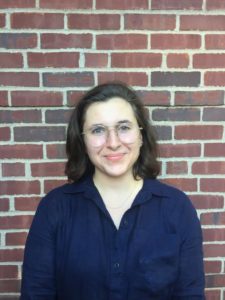
Elizabeth Roten (she/her/hers)
Class of 2018
Geography, Data Science, Community and Global Health
Minnesota AIDS Project
I am passionate about health disparities in different demographic groups and geographies, especially with chronic and sexually transmitted infections. For my project, I partnered with the Minnesota AIDS Project (MAP) to conduct research on mental health. MAP is opening a Rule 47 mental health clinic, and I researched the needs of our community through literature review and a client survey. I also gathered comprehensive feedback from MAP staff through focus groups and interviews. In addition, I participated in various trainings and short assignments as part of making the clinic a reality. In the next few months, I am looking forward to graduating and (maybe) moving to a new city!

Elena Santarella (she/her/hers)
Class of 2019
Political Science, Environmental Studies
Minnesota Pollution Control Agency–Resource Management and Assistance Division
Coming from the West, issues surrounding water are in the forefront of my mind, but I saw less concern for water when communicating with people in Minnesota. As a part of the leadership team for Fossil Free Mac, the school’s fossil fuel divestment club, I am very entrenched in environmental justice issues on a daily basis. With these past experiences in mind, I knew I wanted to complete a project that dealt with water policy in some capacity. Primarily, I wanted to pursue a project that fit with my passion for environmental policy. I also sought to build upon my base of environmental knowledge from my coursework and an internship working with energy and public lands work I completed last summer.
My summer was filled with all things water. From a policy angle, I assisted the Environmental Quality Board with Governor Dayton’s initiative to improve water quality 25% by 2025 by writing regional information packets, drafting letters to the editor, and constructing outreach resources. From an education angle, I physically built an exhibit for the State Fair’s Eco Experience (using an electric saw!) and wrote copy for exhibit pieces. From a communications angle, I learned the nuances of building a social media strategy utilizing an executive calendar and boosting posts to bolster the reach of the social media presence of We Are Water MN, a traveling educational exhibit. Along the way, I led a group of high school students through a community water meeting and attended a Clean Water Council meeting. Overall, I gained knowledge about how people relate to water at the personal and policy level.
Working for a government agency was not on my radar until a professor connected me with my supervisor at the MPCA. The experience has allowed me to see more sides of environmental action and understand Minnesota politics more fully. Working with my supervisor, Britt Gangeness, has been one of the best parts of my fellowship. She encouraged me to pursue responsibility within the 25 by 25 initiative and meet important contacts with informational interviews. My Chuck Green experience would have been vastly different without her feedback and support.
With this, an unexpected highlight of my fellowship remains the opportunity to connect with and learn from a variety of women in powerful positions in the environmental movement. Observing how they navigate running meetings, heading projects, and proposing ideas has been an invaluable experience.
The fellowship placed me within the network of water issue activists in Minnesota. Using the clout of Chuck Green, I was able to establish contacts with people that I would have felt uncomfortable reaching out to in other circumstances. Thus, I look forward to building upon these relationships as I move towards a public policy career centering on water quality issues. I am excited to build upon my passion for water issues through relevant coursework in my remaining three semesters of college and my capstone experience.